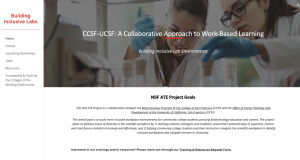A Collaborative Approach to Work-Based Learning in Biotechnology: Building Inclusive Lab Environments

There is a renewed sense of urgency to develop a more diverse workforce in STEM-related fields. This project focuses on community college students from groups that are not yet equitably represented in STEM. These communities have also been disproportionately impacted by the COVID-19 pandemic. Most workforce interventions to prepare students for technical positions have been based on the premise that the students simply need targeted skill training and tips on behavioral norms to be successful in these workplace cultures. This student deficit model puts the burden on the newcomer to navigate a work environment that is often inherently biased against people of color, women, and individuals from groups that are underrepresented in the sciences. However, as leading-edge organizations are recognizing the value of diversity, they are also realizing that they have a role to play in establishing an inclusive workplace culture. This project aims to foster the professional development of students, faculty, industry managers, and academic researchers in inclusive workplace practices. The project expects that these practices can seed true cultural change and prepare a more diverse, inclusive, and productive United States biotechnology workforce.
This project at City College of San Francisco is a collaboration with the Office of Career and Professional Development at the University of California, San Francisco. Its overall goal is to build more inclusive workplace environments for community college students pursuing biotechnology education and careers. The project plans to address issues of diversity in the scientific workforce by 1) teaching industry managers and academic researchers practical ways to supervise, mentor and train future scientists inclusively and effectively, and 2) helping community college students and their instructors navigate the scientific workplace to identify inclusive workplaces and navigate barriers to inclusivity. It builds on prior work that has led to the development of a published framework for inclusive workplace practices in research laboratories, a comprehensive inclusive academic mentor and intern training, and a guided internship program that includes formative assessments and coaching. In collaboration with the California Life Sciences Institute, an organization representing hundreds of biotechnology companies, the project will invest significant resources in developing new frameworks, tools, and curriculum tailored to the needs of the biotechnology industry. Additionally, the project seeks to disseminate the trainings to other community colleges and academic research institutions.
Comments